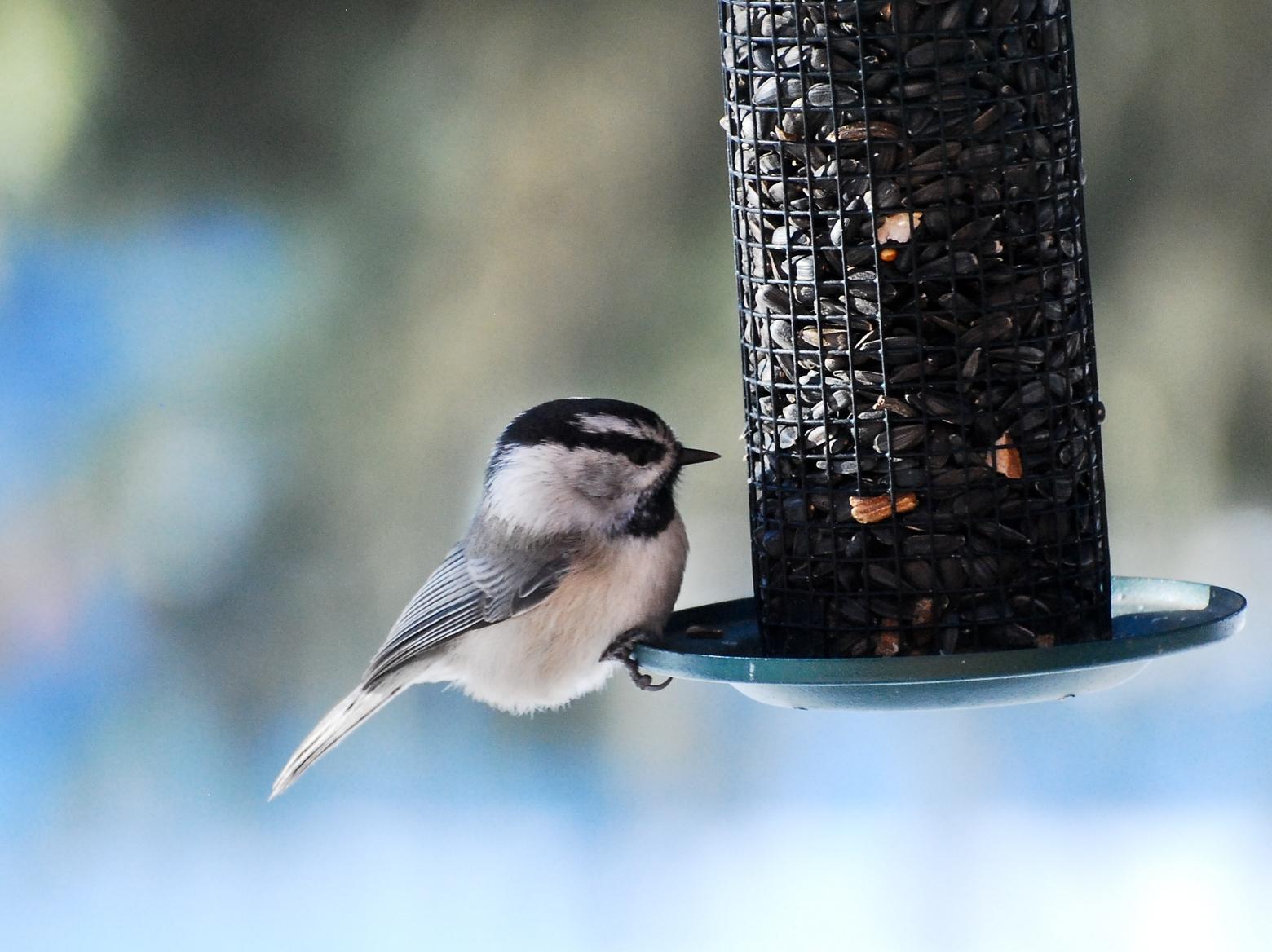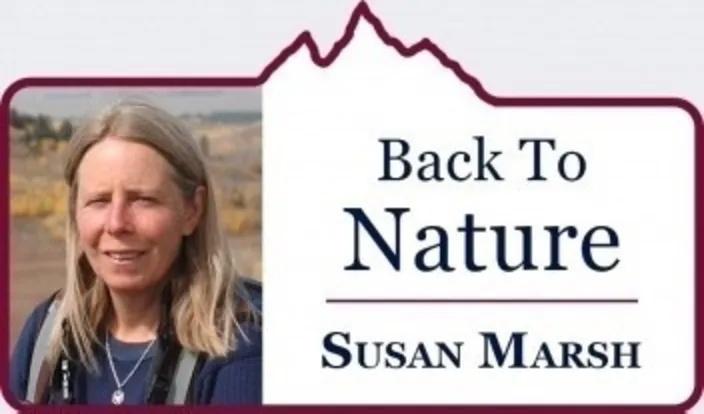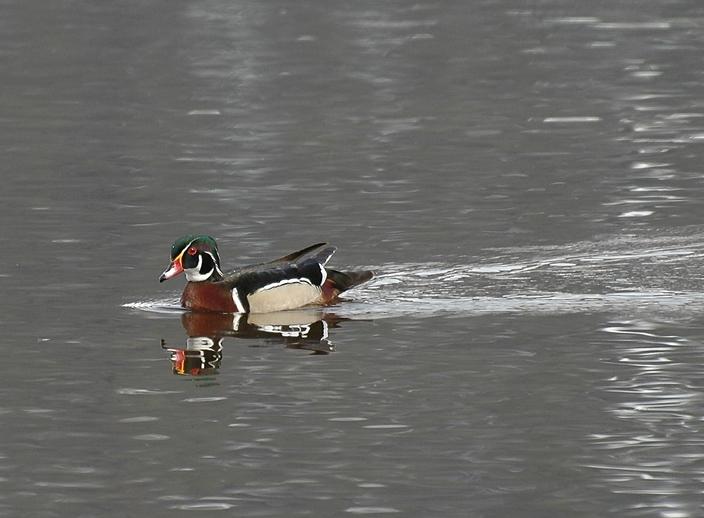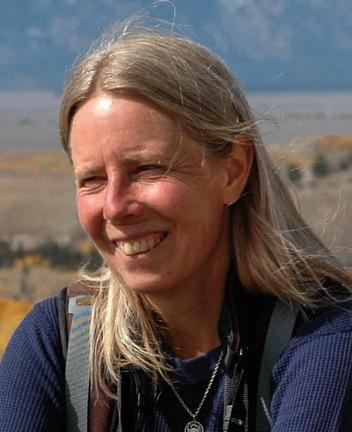Back to StoriesRejecting Despair in the Arms of Nature
April 22, 2025
Rejecting Despair in the Arms of NatureIn an effort to rise above a vicious news cycle, incessant politics and threats to our wildlife and public lands, MoJo columnist Susan Marsh seeks solace in nature and good friends
by Susan Marsh
I’m pretty sure I’m not alone in my struggle to find
encouragement in the current political climate. Most of the time, I still have
the ability to smile as I follow the melting snow and green-up with my rake and
pruners in the front yard. I find the first crocus opening. The aspens I
planted as skinny shoulder-high wands are now 30 feet tall and covered in
catkins backlit by the morning sun. I pause in my work to a faint sound in the
air, barely audible over the noise of construction and leaf-blowers in town:
sandhill cranes on their way north, their voices reaching me where I stand. For
a moment, I feel blessed.
For the past several weeks I’ve been weathering chaos
without falling into despondency, but now that public land is in the
crosshairs, my mood borders on despair. A sense of helplessness sets in as I
imagine a possible future with land that was once free for everyone to enjoy
now gated and posted with “keep out” signs. It has already happened in several
places I used to hike, where land exchanges between the Forest Service and
private landowners have resulted in high-end development and closure to the
public.
For most of my life, I have heard public service
announcements sponsored by the U.S. Forest Service, Bureau of Land Management
and other federal agencies, reminding me to respect and protect my land. If it
is about to be taken from me without my permission, isn’t this called
robbery?
It feels as if I’m being personally attacked. My life and
work have been dedicated to loving, respecting and protecting the land we
Americans share. I believe that our shared estate, along with other public
benefits like libraries and schools, is a real-life manifestation of the
concepts of democracy and equality. In the Greater Yellowstone region, each of
us can hunt, fish, hike, bike, or whatever else in a national forest nearby,
and for some communities, BLM lands are even closer to home. I’m afraid we’re
so used to this privilege we’re taking it for granted.
Not only does public land offer us the chance to get
outside and find joy in being there, it’s also the only land left in the
country large and wild enough to offer habitat for wildlife that needs lots of
space: migratory elk, deer and pronghorn; grizzly bears and wolverines; birds
from cranes to warblers.
Not a day passes when I fail to pause and be grateful to
live in a region that is one of the last areas of wild public land to remain
intact after a couple centuries of settlement, population growth, technological
innovations (trains, automobiles, and so on), and the resulting fragmentation
and outright loss of habitat for creatures on this continent besides ourselves.
I once thought of our public land as protected in perpetuity, in spite of the obvious
fact that in human history there is no such thing as perpetuity.
I once thought of our public land as protected in perpetuity, in spite of the obvious fact that in human history there is no such thing as perpetuity.
Suddenly I can relate in a visceral, rather than merely
sympathetic, way to indigenous cultures who were kicked out of their homes and
subjected to attempted genocide, African families who were kidnapped and sent
here on slave ships, and Japanese-Americans who lost homes and businesses and
community when they were sent to internment camps. Somehow the generations they
created have survived, persisted and found ways to bloom like the aspens now
sending their silver shimmers across our region. But not without unnecessary
pain and death and loss.
In addition to standing back to admire the profusion of
life that comes in springtime, I’m trying to fend off despair by reminding
myself of all I have to be grateful for. That is a much easier task if I cordon
off the part of my heart that will always bleed for the places, creatures and
people who have been poorly treated by dominant cultures worldwide. I can’t
shut off that fire hose of sorrow, but I can give myself moments of rest from
it, by practicing gratitude.
What am I most grateful for? I am
comforted each day by the company of my dog, with whom I bonded after less than
15 minutes when I “fostered” her 10 years ago. She joins the chickadees at the
bird feeder, the mule deer nibbling off the newly opened crocuses, and the
cranes flying over, in their lack of worry over the future. I am reminded of a
favorite poem, “The Peace of Wild Things,” in the 2018 book of the same name by
Wendell Berry, who extolls the “peace
of wild things/who do not tax their lives with forethought/of grief.”
If I could only learn to stop taxing my life with grief, whether for the
future, the present, or the past. I manage to escape despair in the same way
Berry does, by immersion in the intact wild world for a few hours. Yet sorrow
lingers, even when I’m cheered by the other lives surrounding me. In my
imagination, Berry, a farmer, probably has a pond or creek on his property
where he can lie down with the wood drake and great heron and empty his mind. I
can do this only on public land, the place where I once did so without worry
and can’t anymore. I worry most of all for the fate of this precious land.
In addition to standing back to admire the profusion of life that comes in springtime, I’m trying to fend off despair by reminding myself of all I have to be grateful for.
I asked some thoughtful people I know to help me with the
practice of calming myself, and I received answers that have boosted my mood
considerably. With their permission, I’m sharing some of them in hopes that Mountain
Journal readers will be equally encouraged. The following are my
paraphrases of what they had to say.
I am blessed: at
almost 75, I can still hear. At a bit after 6 a.m. it’s dark outside and just
starting to show signs of twilight on the eastern horizon. I step onto the back
deck and am greeted by a cacophony of bird sounds. My list includes sora,
Wilson’s snipe, mallard, Canada goose, sandhill crane, Virginia rail, American
robin, red-winged blackbird, American coot, yellow-headed blackbird, and great
horned owls — two males and a female. I appreciate having the opportunity to
appreciate this. (This person started an
Audubon Society chapter in the late 1980s, looking for a group in a sparsely
settled rural area with whom he could go birding. He couldn’t find enough
people to start a chapter until some generous donors purchased extra
memberships, so the chapter began with exactly the minimum required number: 15.
Today that chapter has over 200 members.)
What
is mine to do is only what is in front of me. The more I step out of the media
frenzy for balancing breaks the more balanced I am. Fear and pain and anger
overwhelm and paralyze me, and I’m no use to anyone in that state, as my
emotions affect everyone I encounter. (This
person is a pastor.)
I'm comforted by my friends and community and the
enduring existence of the stars, clouds, mountains and rocks. Each day I
practice spiritual and physical techniques to bring calm. Time in nature and
time with animals puts all into perspective. (This person has been my best friend since we were preschoolers and
currently shares her home with several foster rabbits.)
Federal probationary seasonal employees who were fired
this winter have almost all elected to come back and so far there is no word
that they may be terminated again. I am grateful for their dedication and
perseverance. We will be able to pull off some good work this summer if they
are able to stay. (This person has worked
for the Forest Service since the early 1980s.)
I will close my stories from
others with one I found to be representative of the kind of resilience and
sense of humor we need these days. The
following story comes from a riparian ecologist.
On Saturday, I ran some errands in town. I have a bike
that I bought used for $25 in 1986, and I was looking for a part to repair a
pedal. The local shops didn’t have what I needed, but one did suggest an informal
bike repair business that was only open on Saturdays. I was pointed to an
obscure location that “has a sign, you'll see it.”
There was no sign, other than several that read “24 Hour Surveillance.” I peered
through the door and could only see a dark, empty, windowless room. I went back
three times to make sure I wasn’t missing something, and now I’m probably on
the police radar as a potential vandal.
I went to the
local thrift store and rummaged through bins of bike parts. No luck. Then I
went to the library to look for a DVD of a movie we wanted to watch again. No
luck. On my way out, I saw a copy of The
Sun magazine on the rack and read the "Readers Write" section — all
about T-shirts. The writing was so engaging that I lost track of time. Finally,
the library was closing and I had to go.
On my way home I stopped for an ice cream cone, where
the flustered young woman at the checkout counter struggled with the till. She
was probably still in high school, working at her first-ever job. I told her I
was in no hurry and offered a few bits of advice and support.
Home at last, I finished the repair of my bike by attaching
a cotter pin to the arm of the pedal. I bought the pin locally instead of
ordering it online and saved myself $20, almost the cost of the bike. The
cotter pin was not quite the right size, so I had to grind it down.
So I spent most of a day trying to run unsuccessful
errands, wanting to get my bike out of the living room where it had been
waiting for parts for over a week, and reading a magazine at the library after
not finding the DVD I wanted.
Maybe for many people, this would have been a
frustrating day, but it was wonderful to me. I solved a mystery (the phantom bike
shop), I enjoyed other people’s stories about T-shirts, treated myself to an
ice cream cone, helped the flustered young clerk with her anxiety, and successfully
repaired my trusty second-hand bike that has served me so well for so long. Everyone
I talked to was so nice.
What I am doing these days is keeping things and
people going as best I can, and letting others do the same for me. I think
that's all we really can do.
Keep going the best I can: that sounds like sound advice to me.
Related Stories
May 9, 2025
The Joy of Native Plant Gardening
Planting native flora in your yard (as opposed to grass) offers more than a
water-saving landscape and haven for pollinators. It can...
March 19, 2025
Seasons of Resurrection
As Easter nears and the vernal equinox is
upon us, the concept of resurrection lives in the rebirth of nature and its
beings.
...
July 19, 2024
Can We be Better ‘Masters of the Household?’
As
residents and visitors in Greater Yellowstone, Susan Marsh writes that we must
consider other species and give them the respect—and space—they deserve.
...





